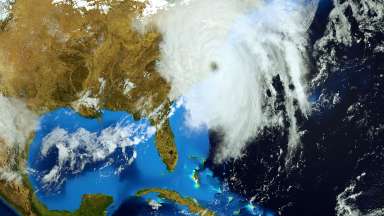Jump To:
Hurricane Watch vs. Hurricane Warning
Hurricanes are massive storm systems that form over warm ocean waters and move toward land. The Atlantic hurricane season runs from June 1 to Nov. 30. Hurricanes can affect areas more than 100 miles inland.
If you are under a hurricane warning, find safe shelter right away!
- Determine how best to protect yourself from high winds and flooding.
- Evacuate if told to do so.
- Take refuge in a designated storm shelter or an interior room for high winds.
- Listen for emergency information and alerts.
- Only use generators outdoors and away from windows.
- Turn around, don’t drown! Do not walk, swim or drive through flood waters. Heed flood warning signs posted in flood-prone areas.
Risks from hurricanes
- Powerful winds (downed trees and power lines)
- Heavy rainfall
- Flooding
- Tornadoes
- Landslides
- Storm surges (coastal areas only)
Hurricane watch vs. hurricane warning
When hurricanes are expected, the weather service will issue watches and warnings.
A hurricane watch means hurricane conditions (sustained winds greater than 74 mph) are possible within the specified area of the Watch. A hurricane watch is issued when there is a threat of hurricane conditions within the next 24 to 36 hours.
A hurricane warning means hurricane conditions (sustained winds greater than 74 mph) are expected in 24 hours or less within the specified warning area.
During a hurricane
- If told to evacuate, do so immediately. Do not drive around barricades.
- If sheltering during high winds, go to a FEMA safe room, storm shelter or a small, interior, windowless room, or hallway on the lowest floor that is not subject to flooding.
- If trapped in a building by flooding, go to the highest level of the building. Do not climb into a closed attic. You may become trapped by rising flood water.
- Listen for current emergency information and instructions.
- Use a generator or other gasoline-powered machinery outdoors ONLY and away from windows.
- Do not walk, swim or drive through flood waters. Turn around, don’t drown! Just six inches of fast-moving water can knock you down and one foot of moving water can sweep your vehicle away. Heed Flood Warning Signs posted in flood-prone areas.
After a hurricane
- Check on friends and neighbors.
- Listen to authorities for information and special instructions.
- Be careful during clean-up. Wear protective clothing and work with someone else.
- Do not touch electrical equipment if it is wet or if you are standing in water. If it is safe to do so, turn off electricity at the main breaker or fuse box to prevent electric shock.
- Avoid wading in flood water, which can contain dangerous debris. Underground or downed power lines can also electrically charge the water.
- Save phone calls for emergencies. Phone systems are often down or busy after a disaster. Use text messages or social media to communicate with family and friends.
- Document any property damage with photographs. Contact your insurance company for assistance.
- Watch for fallen power lines and trees. Do not go near a fallen power line! Report all power line hazards to Duke Energy at 800-228-8485.
Resources
National Hurricane Center (National Oceanic and Atmospheric Association) provides up-to-date forecasts for hurricanes and tropical storms.
NOAA Weather Radio All Hazards is a nationwide network of radio stations broadcasting continuous weather information directly from the nearest National Weather Service office.
Find information about Recovery Assistance Programs at the NC Office of Recovery and Resiliency.
Federal Emergency Management Agency: National Flood Insurance Program
Learn more about Raleigh’s Stream Monitoring and Flood Alert Systems
